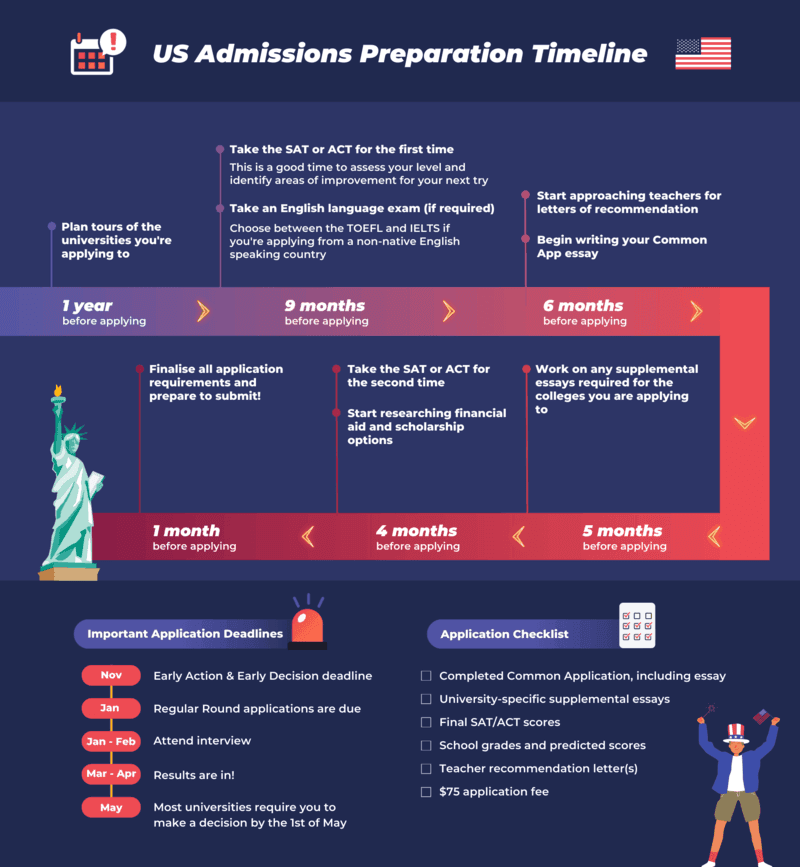How to Apply to US Universities as a Student from Singapore

Summary
To apply to top US universities from Singapore, you'll need strong academics, competitive test scores, meaningful extracurriculars, and thoughtful essays. Remember to factor in National Service and explore scholarships or financial aid options available to international students.
The US is one of the world’s most popular destinations for studying abroad, with more than one million international students studying there each year. Not only are eight of the top 10 global universities located in the US, but it’s also home to more than 5,000 higher education institutions across the country. This blog will break down everything you need to know about applying to US universities and why you should consider it as a student from Singapore.
Why Apply to US Universities
Students from all over the world choose to study in the US for several reasons:
- Freedom and flexibility to explore classes in any subject they want and not having to declare a major until the end of the second year
- The prestige of a US degree
- Opportunities to engage in activities and clubs with a diverse campus community
- Generous internship and undergraduate research opportunities
- Specialised services that support international students
- Superior job prospects due to their proximity to top businesses
What You Need To Know About Applying to US Universities
Here’s what you need to know if you want to apply to American universities as an international student.
- Plan Early. Choose 5-8 universities and determine which type of application they accept. Many universities use the Common Application or the Coalition Application, and some require you to apply directly to the school.
- US universities value extracurricular activities. Choose activities you are passionate about and aim for leadership positions within them.
- Good grades and SAT/ACT scores are still one of the most important parts of your application.
- The US personal essay isn’t the same as the UK personal statement. The UK universities are looking for subject-focused content, while US universities want you to tell a compelling story and showcase your personality.
- Applying early has advantages. Applying early can increase your chance of acceptance to many top schools. However, you can only apply early to one university, and the decision is binding. Only apply early to a school you're 100% sure you want to attend.
- It’s ok to be unsure of your major. You can mark “undecided” on most US university applications.
- Don’t forget the application fee. It’s typically between $75-100 USD.
- Acceptance isn’t conditional. If you’re accepted, you’re in!
The US application process can be complicated, and some universities, like MIT and any of the University of California schools, do not use the Common Application. Others have unique requirements beyond the general application. Universities will go into detail about their requirements on their websites. Carefully read the entire application requirements before you get started.
If you’re still unsure you have everything you need, contact one of our academic advisors at Crimson Education. They will walk alongside you and help you navigate the journey. Let’s work together to achieve your academic dreams!
Key Requirements For US Universities
If you want to study in the USA as an international student, here is what top American colleges require:
Exceptional Academics
Most US universities take a holistic approach when reviewing applications, but that doesn’t mean grades aren’t important. Grades are arguably the most crucial part of your college application, and your chances of studying in the USA are much higher if you have stellar grades. You will need to provide a copy of your high school transcript to showcase this.
This transcript can include your grades in the local A-Level and IB education systems, which are internationally recognised and considered equivalent to a US high school diploma. The depth of study and rigour of the curriculum are comparable to the US Advanced Placement (AP) courses taken by students in the US, making you a competitive candidate!
Typically, graded assessments for admission are weighed in terms of the Grade Point Average (GPA). You may therefore need to convert your A-Level grades to their GPA numerical equivalents. Understanding this conversion is important as it can also help you assess where you stand relative to other applicants vying for a place at a US university. For a detailed explanation of how the conversion works, check out this article, which provides a clear breakdown of the GPA calculation process.
The GPA requirements for US universities vary depending on the selectivity of the institution. A competitive GPA for top-tier universities is typically in the range of 3.7 to 4.0 (unweighted) on a 4.0 scale, while mid-tier universities may accept applicants with GPAs between 3.0 and 3.7. It is essential to research the specific GPA requirements for each university you plan to apply to, as these can vary significantly.
Outstanding Test Scores
SAT/ACT
The SAT and ACT are standardized tests that have traditionally played a significant role in the US university application process for both domestic and international students. These tests help universities assess a student's academic readiness and compare applicants from different educational backgrounds.
However, in recent years, many schools have adopted test-optional policies, which means that submitting SAT or ACT scores is not always required. This section will provide an overview of the SAT and ACT, discuss their importance in the application process, and offer tips for success in the context of test-optional policies.
SAT
The SAT, administered by the College Board, is a multiple-choice test that evaluates students' skills in reading, writing, and math. The test consists of two main sections: Evidence-Based Reading and Writing (which combines reading and writing and language subtests) and Math. The SAT also includes an optional essay section, which some universities may require or recommend.
The total score for the SAT ranges from 400 to 1600, with each main section scored between 200 and 800. Competitive universities typically require SAT scores above 1400, while top-tier schools often expect scores above 1500.
ACT
The ACT, administered by ACT, Inc., is another widely accepted standardized test that assesses students' skills in English, math, reading, and science. The test consists of four main sections: English, Math, Reading, and Science. Like the SAT, the ACT also offers an optional Writing section, which some universities may require or recommend.
The composite ACT score ranges from 1 to 36, based on the average of the four main section scores. Competitive universities usually require ACT scores above 30, while top-tier schools often expect scores above 33.
English Language Tests
In addition to the SAT or ACT, many US universities require international students from non-English speaking countries to demonstrate their English language proficiency. Two widely accepted exams for this purpose are the TOEFL (Test of English as a Foreign Language) and the IELTS (International English Language Testing System). This section will provide an overview of these tests and offer tips for success. However, as a student from Singapore, you may be exempt from having to sit for these tests, given the English-medium education system already equips you with a high level of proficiency!
TOEFL
The TOEFL exam, administered by the Educational Testing Service (ETS), measures your ability to use and understand English in an academic setting. The test has four sections: Reading, Listening, Speaking, and Writing. It is primarily an internet-based test (iBT), but paper-based testing (PBT) is also available in some locations where internet testing is not possible.
Most US universities require a minimum TOEFL iBT score ranging from 80 to 100. However, more competitive schools may require higher scores. It's essential to check the specific TOEFL requirements for each university you plan to apply to.
IELTS
The IELTS is another widely recognized English proficiency test, jointly administered by the British Council, IDP: IELTS Australia, and Cambridge Assessment English. The IELTS exam has two versions: the IELTS Academic, which is designed for higher education, and the IELTS General Training, which is typically for work or migration purposes. International students applying to US universities should take the IELTS Academic test.
The IELTS exam consists of four sections: Listening, Reading, Writing, and Speaking. IELTS scores are reported on a 9-band scale, and most US universities require a minimum overall score of 6.5, with at least a 6.0 in each section. Similar to the TOEFL, more competitive schools may have higher IELTS score requirements.
Diverse Extracurriculars
Extracurricular activities allow students to demonstrate their interests and passions beyond the classroom, showcasing their personal qualities, leadership skills, and commitment to making a difference. In Singapore, most students participate in Co-Curricular Activities (CCAs) as part of their school curriculum. While you can certainly include your CCA involvement in your application, keep in mind that CCAs are mandatory for all students. This means that every applicant will likely have similar activities listed, which can make it harder to stand out. To differentiate yourself from the crowd, it’s crucial to engage in activities that showcase your unique skills, interests, and leadership potential.
A way to do this is by creating a well-developed profile with a range of activities. Ultimately, your admissions officer wants to get a sense of what you make time for and what excites you, beyond academics. In particular, it’s useful for you to showcase a set of endeavours which demonstrate your awareness of issues — anything from environmentalism, to the loneliness epidemic in the elderly — and your desire to help! The common thread through all of these entries should be an accurate reflection of your intellectual curiosity and attention to altruism.
By evaluating a student's extracurricular involvement, admission officers can gain a better understanding of their potential to contribute to campus life and thrive in a diverse, dynamic environment.
Thoughtful Essays
College essays allow applicants to reveal their unique voice, perspective, and experiences, helping admissions officers better understand their character, values, and potential fit within the university community. A well-written essay can set an applicant apart from others with similar academic profiles, making it an essential factor in creating a holistic and competitive application.
While the education system in Singapore will have honed your analytical writing skills, this portion of the application tends to look for a personal story with a cohesive, developed narrative. This can feel quite uncomfortable or unfamiliar when you’re more used to facts and figures, but that discomfort is part of the process! If you start early, you’ll also have enough time to draft and revise your personal essay, to make sure it’s the best it can be.
If you’re still feeling a little lost, you can also look up some example essays to get an idea of what universities are looking for, or consult one of our expert reviewers for feedback and guidance!
Strong Letters of Recommendation
Recommendation letters help build your holistic application by allowing people in your life to give their personal and professional opinions about your academic performance, character and drive. If you want to receive favourable and convincing recommendations, establish strong relationships with teachers, key staff, and leaders of your extracurricular activities.
To facilitate this, you can take note of the three rules of asking, which are:
Ask a teacher or mentor who knows you well: Ideally, you want someone who has worked with you for at least a year and can speak to your strengths accurately!
Ask in person: Though it’s definitely a little nerve-wracking to do so, asking in person is the best way to appeal genuinely to your teachers for their help.
Ask early: As highlighted above, teachers often find themselves buried under requests for recommendations as the application period hits its stride. So, it’s best to get ahead of the curve, and ask early so you know you have all your ducks in a row come time to hit submit!
Supplemental Documents
- Your grade and predicted grades
- Personal statement
- Reference letters
- Copy of passport
- Financial evidence you can cover the cost of university
- Proof of English language proficiency (if applicable)
To learn more, download our free eBook, which provides a complete breakdown on building the perfect application to gain admission into top US universities!
Navigating National Service
If you’re a male Singaporean citizen or permanent resident, you’ll have to attend NS at the earliest opportunity upon turning 18. Naturally, this will affect your timeline for university applications, given that NS creates a two-year delay following your completion of the A levels or IB program.
When it comes to deferment for NS, US universities usually handle requests on a case-by-case basis and tend to be more flexible. Many students, even those not required to serve NS, request a one-year deferment to take a “gap year” before starting university.
For male Singaporean citizens and permanent residents, the situation is slightly different. However, most admissions offices are familiar with NS requirements and are generally accommodating. Some private universities even allow deferments of up to two years.
Public universities, on the other hand, are stricter. They may not grant deferments at all or may do so only under certain conditions. If you’re applying to a public university, it’s best to submit your application in your final year of NS. You can also review the deferment policies of top US universities to see what options are available. But do remember to check with the official institution, as policies can change over time.
Applying for Scholarships/ Financial Aid at US Universities
Studying abroad as an international student can require a significant investment, and many institutions understand this. As a result, US universities offer financial aid on a case-by-case basis, which you can apply for if you think it might be helpful. Generally, this financial aid falls into two categories:
- Need-based: In cases where a student’s family cannot provide the full fee contribution, the student can submit their supporting documents (e.g bank statements) to the financial aid office at their university of choice.
- Merit-based: An alternative to need-based scholarships, students who are high-achieving scholars, athletes, or community leaders may consider applying for merit-based scholarships instead. However, the process for this will vary depending on your school of choice, so do check your eligibility criteria on the specific financial aid website!
Alternatively, there are also schools that implement need-blind admissions, meaning that they do not review your ability to pay the tuition when reviewing your application. As a result, these applications will veer closer to assessing you based on merit, giving you an equal chance of admission regardless of your financial background! Some schools which offer this scheme include Harvard University, the Massachusetts Institute of Technology (MIT) and Yale University.
As a student from Singapore, you’ll be eligible for several scholarships to study in the US. This includes those provided by the Public Service Commission, or the MPower Global Citizen Scholarship, the latter which supports studies at a lengthy list of eligible universities, including Brown and Cornell!
Additionally, you can also consider undertaking an issue-based scholarship, which tends to be unrestricted in terms of the nationalities and programs which they cover!
Key Deadlines for US University Applications
Many international students find the US application process complicated. By breaking down the steps into manageable pieces, you will find the process much less daunting and straightforward. Check out the chart below for a complete US admission preparation timeline.

Here are the steps you need to take to apply to American Universities as an International Student
1. Research colleges
Start researching where you might like to study one year before you start applying to universities. Check out each school’s acceptance rates, location, tuition, campus activities, etc.
2. Make a list of your top universities
Make a list of target, reach, and safety schools. Pick schools in all the categories, so you will have more options when acceptance letters come out. Our college admissions calculator can help you find the right universities!
3. Take college tours
Plan a tour (or virtual tour) of the schools on your list.
4. Start taking tests.
Take the SAT/ACT for the first time about nine months before applying to university.
5. Ask for letters of recommendation.
Start approaching teachers for recommendations about six months before you apply for university.
6. Write your essays
Start writing and refining your college essays, including the Common App essays and/or supplemental essays.
7. Test again
If you’re not happy with your SAT/ACT scores, consider retaking the tests about four months before applying for university.
8. Research financial aid and scholarships
About four months before you apply, research all your financial aid opportunities and any scholarships that will help you pay for university.
9. Put your application together
You should have all the application pieces ready about one month before it’s due. Check and double check you have all the details before submitting your application.
10. Apply for University!
Check your application one last time and press submit!
How do I find an American University that’s Right for me?
You’re the only person who can answer this question. Universities are as unique as the students who go there. If you know what you want to study, choose a university specialising in that study area. If you’re still unsure of what you want to learn, check out:
- Top 10 Degrees in Demand for the Future
- 10 Best Liberal Arts Colleges in the US
- The Best Ivy League Schools
- The Best UC Schools
Think about your academic and personal preferences and goals. Are you interested in a liberal arts education, an Ivy League school, or maybe a school in the University of California system?
Talk with friends, family, and alumni about different schools. Consider visiting your favourite campuses or going on a virtual tour if you can. Crimson has a YouTube channel with videos about students getting into college, a day in the life of a student, and much more! Crimson counsellors can also help you find the universities that best fit your interests and goals.
If you’re wondering if you have the right grades and test scores to get into your top universities, check out our college admissions calculator.
Case Studies
Despite the differences in the academic system, many students from Singapore have overcome adversity to clinch spots in top universities in the US. Don’t just take our word for it — here are some helpful case studies from students, just like yourself, who’ve made it to a top US university!
Crimson Education’s academic advisors walk with you through each step of the process. They keep you on track, help you get ready for testing, provide essay reviews, and more! Best of all, Crimson students are 4x more likely to gain admission into their dream university! If you’re interested in applying to a US university or getting started with Pathfinder, contact a Crimson advisor today!


